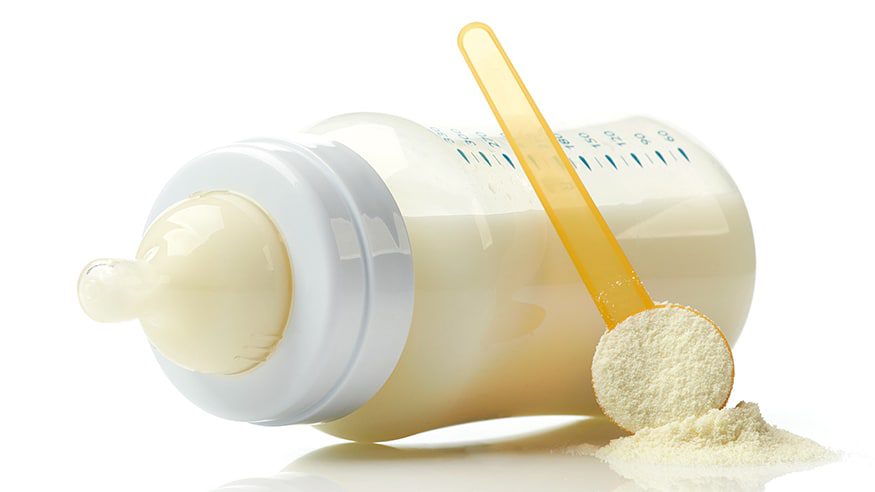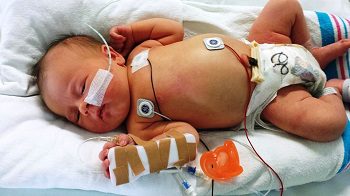
Premature babies often require additional nutrition to support their development and offset their low birth weight. Many doctors will recommend a baby formula for premature children, but recent evidence has linked some brands of baby formula to necrotizing enterocolitis (NEC), a potentially deadly digestive disease that can cause problems for the rest of the child’s life. The cause of developing NEC is not fully understood, but studies have shown the introduction of cow (bovine) milk in newborns, which is commonly used as a base ingredient in many formulas, is a contributing factor.
Baby formula manufacturers are aware of the risk their product may pose to developing infants, yet after many years, they still don’t list it as a possible side effect.
While risks are low for most infants, there are several factors to be aware of if you are giving your newborn formula. Newborns most at risk from developing NEC, according to information from the University of Pittsburgh Medical Center, include premature infants (newborns with birth weights of less than 4.5 pounds make up about 80 percent of necrotizing enterocolitis cases), but full-term babies have also been diagnosed.
NEC often develops within the first two weeks of life, usually after milk feeding has begun (at first, feedings are usually given through a tube that goes directly to the baby’s stomach). About 10 percent of infants weighing less than 3 pounds, 5 ounces (or 1,500 grams) experience necrotizing enterocolitis.
The immature bowels of these babies are sensitive, and prone to infection. They may have difficulty with blood and oxygen circulation and digestion, which increases their chances of developing necrotizing enterocolitis.
If your child developed health concerns as a result of a baby formula product, contact Turner and Turner today for more information on how to fight back.
What Is Necrotizing Enterocolitis?
 According to information provided by The Cleveland Clinic, necrotizing enterocolitis is a potentially deadly digestive disease that commonly affects newborn children. The disease eats away at the intestinal tissue in the body, which can form holes and allow bacteria from other areas of the body to enter and cause infection. The bacteria can lead to sepsis, abdominal infection, narrowing of the intestines, and short bowel syndrome, a condition that makes it difficult for the body to absorb nutrients.
According to information provided by The Cleveland Clinic, necrotizing enterocolitis is a potentially deadly digestive disease that commonly affects newborn children. The disease eats away at the intestinal tissue in the body, which can form holes and allow bacteria from other areas of the body to enter and cause infection. The bacteria can lead to sepsis, abdominal infection, narrowing of the intestines, and short bowel syndrome, a condition that makes it difficult for the body to absorb nutrients.
How Dangerous Is NEC?
Major cases of NEC are life-threatening for underdeveloped infants, but even minor cases can damage the intestinal tissue enough to cause digestive health problems in the future. If the intestinal tract is severely damaged by the disease, the child will need to undergo surgery to remove the eroded tissue, which is problematic considering those prematurely born children aren’t fully developed and don’t have an abundance of that tissue. On the other hand, some infants will recover without issue, but there would be no cause for concern if the manufacturers had acted ethically in the first place.
Which Formulas Use Cow Milk as a Base?
Around 80% of baby formula’s use cow milk as a base, including:
- Enfamil
- Similac
- Earth’s Best
- Happy Baby
- Go & Grow
- Gerber
- Parent’s Choice
- Baby’s Only
- Louloka
- Holle
- Kendamil
- Bobbie
- Lebenswert
Many of these brands offer a different, non-cow milk formula as an alternative. If you’re feeding any of these brands of baby formula to your child, you should make sure that the brand you have is safe for your child’s growth and development.
What Are the Signs of NEC?
NEC happens internally, but there are some warning signs that can display evidence of the disease before it’s too late. You should make sure that the medical professional in charge of your child’s care is monitoring for the following symptoms:
- Abdominal pain and swelling
- Bloody stool
- Green/yellow vomit
- Changes in heart-rate/blood pressure
- Changes in body weight/breathing
- Lack of weight gain
- Refusal to eat
Who Is Liable if My Child Develops NEC From Drinking Cow-Based Formulas?
Manufacturers are responsible for honestly displaying their products’ side effects to the consumers who use them, but this is not the case since these formulas do not display any warnings of NEC as a potential side effect.
If your child developed NEC, you should explore your legal options, which include filing a product liability claim against the manufacturer or a medical malpractice claim against the doctor who gave your child the formula.
Contact Turner & Turner
If your child was diagnosed with NEC as a result of the baby formula they were fed, we understand how stressful and frustrating your situation can be. Our attorneys have years of experience in product liability cases like yours. When you need a law firm to fiercely advocate for the rights that protect you and your child, choose Turner & Turner to handle your case.
Contact Us today by email or call (248) 355-1727 to get started.
